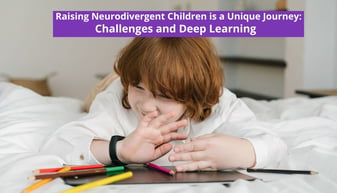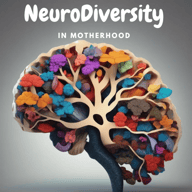Raising Neurodivergent Children is a Unique Journey: Challenges and Deep Learning


For parents who are also neurodivergent, this experience can be even more complex, requiring a delicate balance between caregiving and self-awareness.
This article presents four evidence-based strategies and real-life stories to help neurodiverse families achieve emotional well-being, strengthen bonds, and build support networks.
1. Daily Investment in Mental and Emotional Health
The Impact of Atypical Motherhood
Studies show that mothers of children with neurodivergent conditions (such as autism or ADHD) have a three times higher risk of developing anxiety and depression compared to mothers of neurotypical children. Emotional overload stems from constant advocacy for their children, dealing with social judgments, and managing sensory or behavioural crises.
Proven Strategies:
Self-care is non-negotiable:
Dedicate 10 minutes daily for mindfulness or deep breathing exercises (which reduce cortisol by 30%) (Goyal et al., 2014).
Keep an emotional journal to process feelings and prevent burnout.
Specialised therapy:
Neurodiversity-trained psychologists help develop adaptive strategies.
Support groups reduce feelings of isolation: 86% of mothers report mental health improvements after sharing experiences (Luthar et al., 2020).
"Take care of yourself as you would your child: with patience and priority."
2. Understanding the Challenges and Strengths of Neurodiverse Children
Common Challenges:
Sensory difficulties: 70% of autistic children are hypersensitive to sounds or textures (García & Ortega, 2019).
Emotional regulation: Meltdowns are reactions to overload, not "tantrums."
Potential Strengths to Cultivate:
Divergent thinking: Neurodiverse children often show exceptional creativity and attention to detail.
Intense interests can develop into professional skills (e.g., programming, art).
How to Support:
Use visual tools (like routine charts) to reduce anxiety (Sharma et al., 2021).
Celebrate small victories (e.g., successful social interaction).
3. Parental Support ≠ Permissiveness
Key Difference:
Support = Validate emotions + Provide structure.
Permissiveness = Ignore necessary boundaries.
Strategies for Balance:
Predictable routines: Neurodiverse children consistently thrive (García & Ortega, 2019).
Clear boundaries: Use direct language: "You may feel angry, but you cannot hit."
Reinforce positive behaviours with immediate rewards (praise + preferred activity).
"Accepting neurodiversity does not mean abandoning rules, but adapting them with empathy."
4. Building a Support Network
Why is it Essential?
78% of mothers of children with disabilities report abandonment by partners or family members (Revista Alternativa, 2025).
Support networks strengthen resilience and access to resources (e.g., therapies and legal rights).
How to Build Your Support System:
Connect with other mothers:
Online groups.
Local organisations.
Include professionals:
Occupational therapists, speech therapists, and legal experts in neurodiversity rights.
Ask for practical help:
Friends can help with meals or childcare for a few hours.
Conclusion: An Invitation to Self-Compassion
Mothering a neurodiverse child demands strength, flexibility, and ongoing self-care. Remember:
You do not need to be perfect, just present.
Your well-being is the foundation for your child's growth.
"We are not 'warriors' we are women who learn daily to navigate uncharted waters, and that alone is extraordinary."
References:
SciELO Brasil (2018). Experiences of mothers of children with autism.
Revista Alternativa (2025). Strategies for Neurodiverse Mothers.
Genial Care (2025). Testimonials from Mothers of Autistic Children.
Autismo & Realidade (2021). How to Support Motherhood with Neurodiversity.
